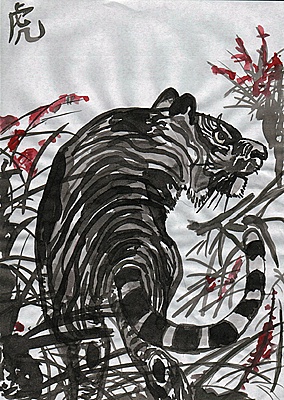All Nonfiction
- Bullying
- Books
- Academic
- Author Interviews
- Celebrity interviews
- College Articles
- College Essays
- Educator of the Year
- Heroes
- Interviews
- Memoir
- Personal Experience
- Sports
- Travel & Culture
All Opinions
- Bullying
- Current Events / Politics
- Discrimination
- Drugs / Alcohol / Smoking
- Entertainment / Celebrities
- Environment
- Love / Relationships
- Movies / Music / TV
- Pop Culture / Trends
- School / College
- Social Issues / Civics
- Spirituality / Religion
- Sports / Hobbies
All Hot Topics
- Bullying
- Community Service
- Environment
- Health
- Letters to the Editor
- Pride & Prejudice
- What Matters
- Back
Summer Guide
- Program Links
- Program Reviews
- Back
College Guide
- College Links
- College Reviews
- College Essays
- College Articles
- Back
Did He Who Make the Lamb Make Thee?
Everything in creation reveals something about its Maker. In his poems "The Tiger" and "The Lamb," William Blake marvels at the fact that two animals so different from each other were made by the same God.
The Tiger is a fearsome creature. In describing it, Blake uses the phrases "fearful symmetry," "the fire of thine eyes," and "the sinews of thy heart." He imagines the tiger's eyes being plucked from the depths of the sky and its brain being forged in a furnace. To fashion a creature of flame and steel, one must have mastery over flame and steel. God alone is strong enough to have crafted such a beast — indeed, God alone is brave enough. The fact that God has made something as terrible as the tiger shows that God is, in a sense, terrible. He is all good, but he is frightening. He is powerful. He is magnificent. He could destroy us with a breath if he so desired.
On the other hand, we have the Lamb, which was also made by God. Blake puts his poem "The Lamb" in the mouth of a child, joyfully exulting over the lamb's delightful qualities. We can imagine the little speaker prancing about the lamb, throwing his arms about it, and clapping his hands with delight. The Lamb is a gentle, loveable creature, who has "softest clothing wooly bright" and "such a tender voice." The one who made the Lamb is gentle and loveable, too. "He is meek and he is mild," so much so that "he calls himself a Lamb" and "became a little child." God is infinitely gentle. He is so humble and loving that a child can cuddle up to him comfortably, just as he might cuddle up with a lamb.
God is terrible enough to build a tiger. Yet he is gentle enough to mold a lamb in his image. How can this be? It is one of the great mysteries of God's existence. He is all-perfect. This infinite perfection means that he has every virtue in full, even the ones we frail humans see as contradictory. We admire strength and power. We also admire meekness and gentleness. We find it unspeakably hard to be both powerful and meek. But God is both. Not only does he manage to compromise the two virtues, he manages to hold both virtues in their most extreme forms. He is not just powerful and meek, he is most powerful and most meek. He is strong enough to crush the globe with his metaphorical little finger yet gentle enough to stroke a butterfly without harming it.

Similar Articles
JOIN THE DISCUSSION
This article has 0 comments.

This was written for my high school literature class.